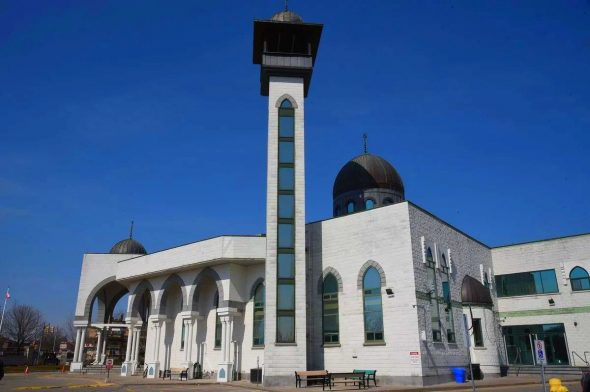
Islamic Society of Markham mosque was the site of an attack on April 10, 2023. A man alledgedly uttered Islamophobic remarks, tore a copy of the Qur’an and attempted to drive his car into congregants in the parking lot. (Photo: STEVE SOMERVILLE)
Guest Blog Post by Stephen Zhou
It’s been a strange few weeks.
Canadian Muslims just finished the holy month of Ramadan, a time of expected vibrancy and community.
But happy times have been dimmed by a staggering spike in Islamophobic incidents across the country that have ruined the month for many.
The dominant target seems to be mosques, where large crowds of Muslims are gathering for multiple daily prayers that can go late into the night.
A few of these alleged incidents have made headlines.
Like the man who tried to drive his car into congregants at the Islamic Society of Markham.
Or the two Muslim women who had a gun pointed at them by a fellow driver in Kitchener, Ontario, as they headed home from the masjid.
Or the guy who shattered the glass doors of a mosque in Montreal.
Or the young Muslim woman who had a knife pulled on her in the Toronto subway.
Or the increasing cases of vandalism at Muslim community spaces.
The list goes on and on.
But this is just the tip of the iceberg.
Most cases don’t make the news.
The National Council of Canadian Muslims, which helps community members respond to such incidents, has received over 40 reports from community members across Canada since Ramadan started — a record number.
The single day high is seven reports, another record.
But not every case makes headlines.
Community members who come to us for help often don’t want media attention.
These numbers also don’t include reports of incidents taking place in Canada’s schools that NCCM’s education department has been fielding — about one per day since January (another record).
These incidents involve Islamophobic bullying in classrooms, usually from other students or even teachers.
NCCM finds that parents are often frustrated with school administrators who have little experience dealing with Islamophobia, and sometimes downplay its severity.
Caseworkers then step in to help resolve the issue, often by providing Islamophobia training to school staff.
NCCM records a higher volume of troubling reports almost every Ramadan, but this year was especially bad.
The holy month already makes the Muslim community more visible than usual.
Thousands of worshippers head to mosques to experience the sacred time together.
Many community centres also run extra programs, speaker series, and meals.
In recent years, Ramadan has been occurring in spring and summertime according to the Islamic lunar calendar.
This means worshippers are hanging out more right outside of mosques and community facilities.
This increases their public visibility in general and likely to those who have this month caused harm.
These outdoor gatherings might help explain the increasing number of attackers who are using their cars to intimidate or hurt congregants this month.
Such incidents recall the truck attack in 2021 that killed four members of the same Muslim family two years ago in London, Ontario.
There have been some close calls this year.
After a brief dip in 2020, Statistics Canada reported that the number of Islamophobic hate-motivated attacks reported to police in 2021 — 144 — have climbed back toward levels we’ve seen without fail since 2013.
Often more than 150 cases have been reported per year and in 2017 a staggering 349.
The number of reports that NCCM is getting seems to fit these unfortunate statistics.
All this is giving the Muslim community pause during a time when neighbours and congregants are supposed to achieve more serenity in their faith.
It is hard to gather oneself or to breathe lightly when the reverberations of Islamophobic hate are felt all around our communities.
More people are wondering why the problem seems to be getting worse despite so many promises by elected officials to address Islamophobia.
Mosques are again talking about reshaping security measures to ensure maximum safety.
It has been a surreal time.
The response needs to be solidarity from all Canadians to stop repeated cycles of violence.
We all need to commit to rooting out Islamophobia and hate in our society.
Whether it’s reforming the government’s Security Infrastructure Program to help beef up mosque security, or implementing better measures to prevent hate crimes, promises must become tangible progress.
This isn’t just a Muslim community problem.
Hate is a problem for our whole country to help address.
The quicker we get to work, the better chance we have to prevent tragedy.
Steven Zhou is a writer for the National Council of Canadian Muslims.